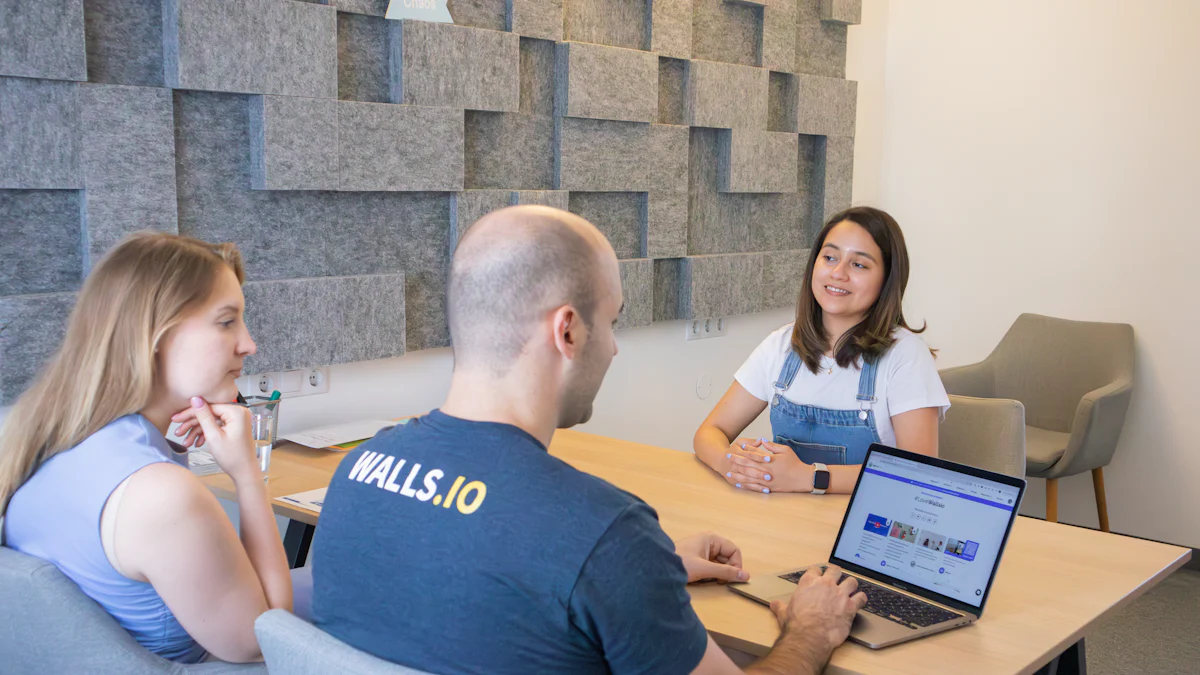Emerging Trends in Multilingual Job Postings for 2025

The demand for multilingual job postings is skyrocketing as businesses expand globally. Between 2010 and 2015, bilingual job opportunities more than doubled, and since 2020, remote multilingual roles have surged by 30%. Companies now prioritize multilingual marketing to connect with diverse audiences. Advanced technologies like AI are reshaping global hiring trends, enabling precise assessments of language skills and cultural fit. You can see how diversity and inclusion are no longer optional—they are essential. Organizations embracing these values outperform competitors by 35%, proving that multilingual hiring drives success in today’s interconnected world.
Technological Advancements in Multilingual Job Postings

AI-Powered Recruitment Tools
AI solutions are revolutionizing multilingual job postings, making recruitment faster and more efficient. You can now rely on AI-driven matching systems to evaluate skills and language proficiency with remarkable accuracy. These tools streamline candidate screening, saving valuable time for recruiters. Real-time translation tools also enhance communication, breaking down language barriers and creating impactful user experiences for candidates. Platforms designed to comply with international labor laws further simplify global hiring. Most importantly, AI tools reduce bias in hiring, ensuring fair opportunities for multilingual candidates. These advancements are reshaping recruitment trends and setting new standards for the language services industry.
Machine Learning for Language Proficiency Assessment
Machine learning is transforming how you assess language skills. Advanced algorithms analyze responses from millions of test-takers, delivering precise evaluations of language proficiency. Adaptive questioning tailors assessments to each candidate’s ability, creating a personalized and accurate evaluation process. Fraud prevention measures ensure the integrity of results, giving you confidence in your hiring decisions. These innovations not only improve user experiences but also elevate the standards of the language services industry. With machine learning, you can identify top multilingual talent with ease and precision.
Automation in Resume Screening for Multilingual Roles
Automation is a game-changer in resume screening for multilingual roles. AI tools powered by Natural Language Processing (NLP) and machine learning can screen resumes contextually, identifying the best candidates in record time. Tools like Textkernel support over 18 languages, making it easier to evaluate diverse candidates. Platforms such as Ribbon and XOR take it a step further by offering multilingual resume screening and conducting interviews in multiple languages. Ribbon even supports interviews in seven languages, providing instant feedback to enhance the user experience. These tools not only improve efficiency but also ensure that multilingual marketing and software localization roles are filled with the right talent.
Industries Shaping Global Hiring Trends
Healthcare and Medical Services
The healthcare industry is transforming rapidly, and you are witnessing a growing demand for multilingual professionals. As patient populations become more diverse, the need for bilingual healthcare workers has never been greater. Roles like medical interpreters are essential for bridging communication gaps between patients and providers. You also see professionals managing cross-border regulatory affairs playing a critical role in ensuring compliance and effective communication.
Multilingual skills in healthcare go beyond language. They help create trust and improve patient outcomes. Imagine a scenario where a patient feels understood in their native language—it fosters confidence and enhances care quality. By embracing multilingualism, healthcare organizations can better serve their communities and build stronger connections with patients.
Information Technology and Software Development
Technology is at the forefront of global hiring trends, and you can see why. Multilingual professionals are vital for customer support, software localization, and global product launches. In IT, language proficiency ensures seamless communication with international clients and teams. It also plays a key role in adapting software to meet the cultural and linguistic needs of diverse markets.
As companies expand globally, they rely on multilingual talent to navigate the complexities of international markets. You can contribute to this growth by leveraging your language skills in roles like technical support, project management, or software development. The tech industry offers endless opportunities for those who combine technical expertise with multilingual abilities.
International Business and Trade
Globalization has reshaped the way businesses operate, and you are at the center of this transformation. Multilingual professionals are in high demand to negotiate deals, manage partnerships, and expand into new markets. Companies that invest in multilingual talent gain a competitive edge by overcoming linguistic and cultural barriers.
Did you know that bilingual individuals can earn 5%-20% more per hour than monolinguals? This highlights the value of language skills in international trade. By speaking multiple languages, you can help businesses establish lasting relationships and navigate regulatory environments. Your ability to communicate effectively across cultures makes you an indispensable asset in today’s interconnected world.
Tourism and Hospitality
The tourism and hospitality industry thrives on creating unforgettable experiences. Multilingual professionals like you are at the heart of this transformation. Your ability to communicate in multiple languages can open doors to exciting opportunities in this dynamic field. 🌍
Imagine welcoming international travelers to a luxury resort or guiding them through a cultural tour in their native language. You create connections that go beyond words. Multilingualism allows you to deliver personalized service, making guests feel valued and understood. This skill is a game-changer in an industry where customer satisfaction reigns supreme.
Tip: Learning high-demand languages like Mandarin, Spanish, or French can significantly boost your career prospects in tourism.
Here’s how multilingualism is shaping the future of tourism and hospitality:
Guest Relations: Hotels and resorts seek multilingual staff to cater to diverse clientele. Your language skills can help resolve issues, answer questions, and enhance guest experiences.
Travel Agencies: Multilingual travel consultants are in demand to plan seamless trips for international clients. You can help bridge cultural gaps and ensure smooth communication.
Tour Guides: Speaking multiple languages allows you to share stories and history with travelers from around the world. You bring destinations to life in ways that resonate deeply with visitors.
Event Management: Global events require professionals who can coordinate with vendors and attendees from different countries. Your multilingual abilities make you an indispensable asset.
The rise of eco-tourism and sustainable travel has further increased the need for multilingual talent. You can play a vital role in promoting responsible tourism by educating travelers about local customs and environmental practices.
Your language skills are more than just a tool—they are a passport to a fulfilling career. Embrace the opportunities in tourism and hospitality, and you’ll find yourself at the forefront of a global movement. 🌟
Skills and Qualifications for Multilingual Job Postings
High-Demand Languages for 2025
The demand for specific languages is evolving as global markets shift. By 2025, you’ll find certain languages dominating multilingual job postings. Here’s a list of the most sought-after languages:
Python – 23.84% ratings
C++ – 10.82%
Java – 9.72%
C – 9.10%
C# – 4.87%
JavaScript – 4.61%
Go – 2.17%
SQL – 1.99%
Visual Basic – 1.96%
Fortran – 1.79%
These languages are essential for roles in IT, software development, and multilingual marketing. Learning one or more of these can significantly boost your career prospects. As companies expand globally, they need professionals who can bridge linguistic gaps and adapt to diverse markets.
Certifications and Language Proficiency Tests
Certifications validate your language skills and make you stand out in recruitment processes. Employers value standardized tests like DELE, TOEFL, IELTS, and STAMP 4S. These certifications demonstrate your ability to communicate effectively in professional settings.
ACTFL tests are another gold standard in the language services industry. They assess proficiency in over 120 languages and offer flexible formats. This accessibility ensures you can showcase your skills regardless of your location. Certified translation services often require these credentials, making them a valuable asset for multilingual professionals.
Earning certifications not only enhances your resume but also builds confidence in your abilities. You’ll find that employers trust these qualifications to measure your readiness for multilingual roles.
Soft Skills Paired with Multilingual Abilities
Your language skills become even more powerful when paired with soft skills. Communication, empathy, and adaptability are essential for creating inclusive workplaces. As a multilingual professional, you can bridge cultural divides and foster collaboration. This ability is invaluable in industries like customer service, recruitment, and localization.
In the service sector, soft skills complement multilingualism by improving customer interactions. You’ll find that understanding cultural nuances helps you connect with clients on a deeper level. This not only enhances relationships but also drives business success.
By combining technical expertise with interpersonal skills, you can position yourself as a leader in the language services industry. Your ability to navigate diverse environments will set you apart and open doors to exciting opportunities.
Tip: Focus on developing both your language proficiency and soft skills. This combination will make you an indispensable asset in any organization.
Globalization, Remote Work, and Diversity in Hiring

Expansion of Cross-Border Teams
Globalization has transformed the way businesses operate, and you are witnessing a surge in cross-border teams. Companies now embrace a global talent strategy to access the best multilingual professionals, regardless of location. This approach allows businesses to tap into diverse skill sets and perspectives, fostering innovation and creativity.
You play a vital role in this shift. Your ability to communicate across languages and cultures makes you indispensable in the global marketplace. Employers value multilingual professionals who can bridge gaps and ensure effective communication between international teams. Fluency in high-demand languages like Mandarin or Spanish opens doors to exciting opportunities in industries like localization, recruitment, and international trade.
Cross-border teams also bring unique challenges. Time zone differences and cultural nuances require adaptability and strong collaboration skills. By mastering these, you can thrive in a remote and hybrid work culture that values diversity and inclusion.
Increased Demand for Remote Multilingual Professionals
The rise of remote work has unlocked new possibilities for multilingual professionals. You no longer need to relocate to work for global companies. Instead, you can contribute to international projects from the comfort of your home. This flexibility has made remote roles more appealing and accessible.
Research shows that bilingual individuals earn up to 20% more per hour than monolinguals. This highlights the growing demand for language skills in remote settings. Employers prioritize candidates who can navigate cultural differences and communicate effectively with global clients. Your expertise in multiple languages positions you as a key player in this evolving job market.
Remote work also allows you to explore diverse sectors, from recruitment to localization. Whether you’re managing cross-border teams or supporting global marketing campaigns, your skills are in high demand. By embracing this trend, you can build a fulfilling career that transcends borders.
Challenges in Managing Multilingual Remote Teams
Managing multilingual remote teams requires overcoming significant hurdles. Communication barriers often lead to misunderstandings and project delays. Poor communication is a leading cause of project failures, affecting nearly 56% of them, according to a study by the Project Management Institute.
Time zone differences complicate scheduling and can lower team morale. Cultural differences may clash with company norms, creating friction among team members. As a multilingual professional, you can help bridge these gaps by fostering understanding and promoting effective communication.
Language barriers also pose challenges. Translating not just words but intent and meaning is crucial for team cohesion. Your ability to navigate these complexities makes you an asset in remote team management. By addressing these challenges, you can contribute to a more inclusive and productive work environment.
Tip: Focus on developing cultural sensitivity and adaptability. These skills will help you excel in managing diverse teams and overcoming common obstacles.
Future Outlook and Challenges in Multilingual Hiring
Inclusivity in Multilingual Hiring Practices
You are stepping into a future where inclusivity defines success in multilingual recruitment. Companies are realizing that diversity is not just a buzzword but a driver of innovation and growth. By embracing multilingual talent, businesses can connect with global audiences and foster creativity within their teams. However, balancing inclusivity with efficiency remains a challenge.
Ensuring ethical hiring practices is essential for fairness. You must consider cultural nuances and interpersonal skills when evaluating candidates. Human oversight plays a critical role in maintaining this balance. AI tools can assist in recruitment, but they cannot replace the empathy and understanding that you bring to the process. By prioritizing diversity and inclusion, you can help organizations build stronger, more cohesive teams.
Ethical Concerns in AI-Driven Recruitment
AI is transforming recruitment, but it comes with ethical challenges. You may encounter systems that unintentionally perpetuate biases from historical data. This can lead to unfair outcomes for multilingual candidates. The opaque nature of AI algorithms makes it difficult to identify and address these biases. Transparency is crucial for candidates to trust the process.
To ensure fairness, companies must take proactive steps. Regular audits of AI systems can uncover hidden biases. Training AI on diverse datasets helps create more equitable evaluations. Human oversight remains vital to account for cultural subtleties that algorithms might miss. By addressing these concerns, you can contribute to a recruitment process that values diversity and inclusion.
Bridging the Gap Between Supply and Demand
The demand for multilingual professionals is growing, but the supply often falls short. You can help bridge this gap by developing your language skills and earning certifications. Employers are looking for candidates who can navigate the complexities of globalization. Your ability to communicate across cultures makes you a valuable asset in this evolving job market.
Companies must also invest in training programs to develop multilingual talent. By fostering a culture of learning, businesses can prepare their teams for the challenges of global hiring trends. You have the power to shape the future by embracing diversity and inclusion in your career journey. Together, we can create a world where multilingualism is celebrated and rewarded.
The future of multilingual job postings is bright, with industries like healthcare, technology, and tourism driving demand for multilingual professionals. As global markets evolve, your language skills can set you apart, opening doors to exciting opportunities. Trends like AI-powered recruitment and remote work are reshaping how companies hire, making adaptability and cultural awareness essential.
To prepare for these opportunities, focus on enhancing your language proficiency and showcasing your skills on your resume. Highlight your ability to improve user experiences and foster inclusivity. Consider earning certifications to validate your expertise and position yourself as a top candidate.
For employers, embracing diversity in multilingual hiring is key. Use data-driven tools to identify talent, celebrate cultural differences, and create inclusive workplaces. By prioritizing multilingual marketing and workforce integration, you can attract and retain top talent while fostering innovation. Together, we can build a future where multilingualism thrives.
FAQ
What are the top industries hiring multilingual professionals in 2025?
You’ll find opportunities in healthcare, IT, international trade, and tourism. These industries value your ability to connect with global audiences and navigate cultural differences. Multilingual skills open doors to roles like medical interpreters, software localizers, and global marketing specialists. 🌍
How can I improve my chances of landing a multilingual job?
Focus on learning high-demand languages like Mandarin or Spanish. Earn certifications like TOEFL or DELE to validate your skills. Highlight your language abilities and soft skills on your resume. Employers value adaptability and cultural awareness, so showcase these traits during interviews.
Are remote multilingual jobs becoming more common?
Yes! Remote work has created exciting opportunities for multilingual professionals. You can now work for global companies without relocating. Roles in localization, customer support, and international project management are in high demand. Your language skills make you a valuable asset in this flexible job market.
What certifications should I pursue for multilingual roles?
Certifications like DELE (Spanish), TOEFL (English), and DELF (French) are highly regarded. ACTFL tests assess proficiency in over 120 languages. These credentials demonstrate your expertise and boost your employability. Employers trust these certifications to evaluate your readiness for multilingual positions.
Why are soft skills important for multilingual professionals?
Soft skills like empathy, adaptability, and communication enhance your language abilities. They help you connect with clients and colleagues across cultures. Employers value professionals who can foster collaboration and inclusivity. Pairing soft skills with multilingualism makes you a standout candidate in any industry.
Tip: Practice active listening and cultural sensitivity to strengthen your soft skills.
See Also
Overcoming Language Challenges in Recruitment With ATS
Moka Recruiting's Global Launch: Enhancing Global Hiring Efforts
Streamline Your Recruitment With MokaHR's Talent Solutions
From recruiting candidates to onboarding new team members, MokaHR gives your company everything you need to be great at hiring.
Subscribe for more information

